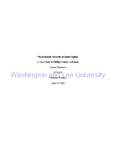The Economic Necessity of Social Capital: A Case Study in Phillips County, Arkansas

View/
Author
Francisco, Samara
Subject
Washington and Lee University, Shepherd Poverty Program
Arkansas -- Phillips County
De facto school segregation
Infrastructure (Economics)
Community development -- Economic aspects
Social capital (Sociology)
Metadata
Show full item recordDescription
Samara T. M. Francisco is a member of the Class of 2010 of Washington and Lee University. Capstone; [FULL-TEXT FREELY AVAILABLE ONLINE] While much of the debate surrounding poverty issues in the United States focuses on individual initiative and responsibility, the community in which individuals reside also plays an important role in the empowerment of individuals and the alleviation of poverty for the community as a whole. To detect the vitality of community life and its relationship with economic prosperity, scholars have applied the notion of social capital to strategies for reducing poverty. One particular method calls for the fostering of social capital, followed by the implementation of economic initiatives utilizing principles from the Community Economic Development movement. In the Mississippi Delta, and specifically Phillips County, Arkansas, such a model has the potential to produce great returns for the community and to assist in the alleviation of poverty. [From introductory section]